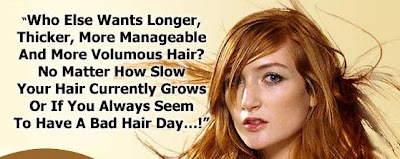long hair makes a woman feel feminine, beautiful, attractive and glamorous. Practically all women, at some time in their lives, want to grow their hair really long. And almost all men want their woman to have long hair. If you have long hair then it is true you have to take care for your hair and have to devote exclusive time for hair care. Having a healthy, shiny and beautiful hair takes a commitment to continuing care.

Besides professional cutting or trimming every two months to promote natural bounce and remove split ends, giving long hair special attention at home each day will help make it the best it can possibly be. Even if you have neglected your hair in the past, it's never too late to get to the root of the problems associated with it, or to practice some preventive maintenance. Therefore learning a few tips for caring for your long hair is handy and helpful. Therefore we have brought for you tips to help you manage those long locks.To achieve beautiful, shiny and long hair we recommend that you let these tips go straight to your head:

Washing
When washing your hair, you should treat it with the utmost care. Over enthusiastic rubbing, scrubbing and pulling can lead to quite a lot of damage and hair loss and therefore should be avoided. Hair should be rinsed very, very thoroughly and with care. Never bunch your hair up when you wash it. Keep it straight down as you wash from the scalp to the tips, running your fingers lightly through your hair to keep it from tangling and to fully wash it. Use a mild shampoo and try to have the last rinse with cold water. This shrinks the molecules of the hair and gets rid of superfluous coatings, making hair much more manageable. Use a good conditioner to condition your hair. When you've finished the washing and conditioning process, mop up excess water with a towel wrapped around your head for a few minutes.
When washing your hair, you should treat it with the utmost care. Over enthusiastic rubbing, scrubbing and pulling can lead to quite a lot of damage and hair loss and therefore should be avoided. Hair should be rinsed very, very thoroughly and with care. Never bunch your hair up when you wash it. Keep it straight down as you wash from the scalp to the tips, running your fingers lightly through your hair to keep it from tangling and to fully wash it. Use a mild shampoo and try to have the last rinse with cold water. This shrinks the molecules of the hair and gets rid of superfluous coatings, making hair much more manageable. Use a good conditioner to condition your hair. When you've finished the washing and conditioning process, mop up excess water with a towel wrapped around your head for a few minutes.
Shampooing
Choose shampoos containing only natural ingredients with conditioning properties. First, remove surface dirt through gentle rinse. Rinse and lather again, massaging your head to increase the blood supply to the scalp and roots. Don't vigorously rub braids or weaves but do rinse in cascades of water to clean the hair thoroughly. Wash your hair more frequently if you have itching, flaking or dandruff. These conditions are not due to dryness. Thoroughly rinse out conditioner, or the residue will dirty your hair faster.
Combing
Never brush hair when it's wet. De-tangle as much of your hair as you can with your fingers. Finally, use a wide-spaced comb to smooth and untangle your hair gently. Begin to comb from the bottom, working slowly up the strands. Never start at the top and tug downwards as this can do a lot of damage to your hair.
Brushing
Bend forward allowing hair to fall. Use a large oval brush to bring hair from the nape of the neck over the head and down to the ends. Then, stand straight again with hair falling normally and brush from the underside of the hairline down the strands to the ends. Now, brush the top layers into place with long, even strokes. After each stroke, smooth hair with hands to reduce static. Increase the number of strokes daily until you find a comfortable routine. Never brush hair when wet.
Bend forward allowing hair to fall. Use a large oval brush to bring hair from the nape of the neck over the head and down to the ends. Then, stand straight again with hair falling normally and brush from the underside of the hairline down the strands to the ends. Now, brush the top layers into place with long, even strokes. After each stroke, smooth hair with hands to reduce static. Increase the number of strokes daily until you find a comfortable routine. Never brush hair when wet.
Drying
Dry hair naturally always since it is good for your hair texture. If blow-drying is necessary, blow in downward strokes only on cool setting.
Oiling
A healthy scalp produces natural oil, which coats the hair strand and protects it from the environment. Therefore brush your hair regularly for 10 to 15 minutes in order to distribute the scalp oil over and down to the end of the hair. If you have dry hair at the ends then use good oil products for your hair and apply the oil directly to the areas where it is needed. Do not apply too much oil to your hair as it will make your scalp and hair sticky which will in turn attract too much dirt and make your hair dirty very soon.Protection
Protect your hair from over-exposure to sun, salt, chemicals or chlorinated water, wind and pollution. Wear a hat, cap or scarf if you can. Seek out hair products with sunscreens.

No comments:
Post a Comment